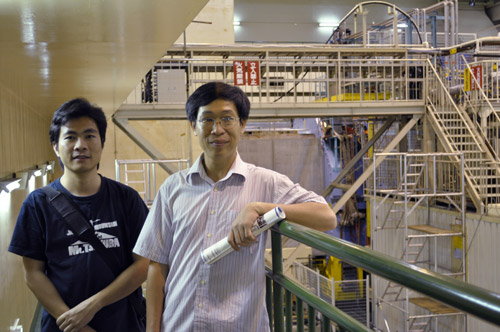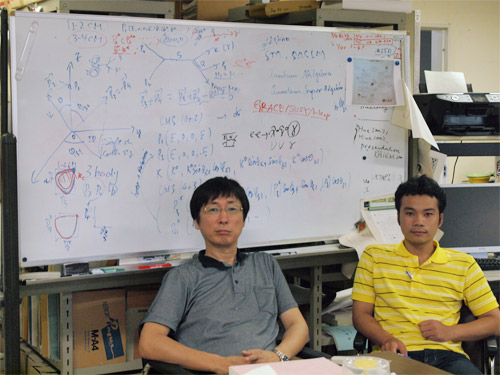Highlights
Deepen the bonds: collaboration between Vietnam and KEK
26 Aug 2010
Vietnam and Japan have been nurturing cooperative relationship in many fields for many years. For the field of science and technology, both governments signed the Japan-Vietnam Science and Technology Co-operation Agreement to promote and deepen the co-operation in science and technology in 2006. Following year, Shinzo Abe, then Prime minister of Japan, proposed at the East Asia Summit (EAS) to launch a youth exchange initiative totaling 35 billion Yen over five years including the invitation to 6,000 young people from the member countries of ASEAN and EAS to Japan, which was accepted with great welcome. Now, these invitations are bringing many Vietnamese scientists to KEK.
There are several small accelerators that have been working since the 1970s for low-energy nuclear physics research and activation analysis in Vietnam. "Recently, the accelerators are also used in industry and hospitals, but the number of them are still limited. I am very excited to see the high-energy accelerators and detectors here at KEK," said Professor Hoang Son Do from the National University of Ho Chi Minh City, who studied theoretical physics at the University of Lyon, France and spent his post-doc period doing research at Mainz University in Germany, but never had a chance to see a high-energy accelerator until he visited KEK.

Fig 1
Phan Hong Khiem(left) and Prof. Hoang Son Do(right) at the Belle experiment hall.
Son has stayed at KEK for one month with Mr. Tran Minh Hieu, a graduate student from Vietnam National University, Hanoi (VNU) through the Exchange Program for East Asian Young Researchers funded by the Japan Society for the Promotion of Science (JSPS), which was launched as a follow-up action on an earlier decision at the EAS 2006. KEK will accept 12 Vietnamese scientists and students to stay and conduct collaborative research through this program during a one-year period that started in October last year.
Dr. Yoshimasa Kurihara, associate professor at KEK's Institute of Particle and Nuclear Study, who coordinates this program, is a numerical calculation expert for collider physics, and is now working on the calculation for cross sections of the experiments at the Large Hadron Collider (LHC) at CERN, and the International Linear Collider. Especially for the super-precise measurements expected at future colliders such as the ILC, precise theoretical calculations are key for the success. "Most of the ten exchange scientists and students are working on the calculation on the quantum chromodynamics or supersymmetry theory, and on the development of the software for symbolic manipulations," Kurihara said. There are also some experimental physicists who are working on T-violation experiments ongoing at KEK or on the development of the software using GEANT, a detector description and simulation tool.
Prior to those collaborations at state level, KEK has carried out cooperative research projects within the Core University Program, a framework for international cooperative research centering around universities designated as core universities in Japan and in the counterpart Asian countries. The program started with Thailand and Indonesia in 1978, and expanded to the Philippines in 1979, to Singapore in 1983, to Malaysia in 1984, to China in 1993, to Republic of Korea in 1998, and to Vietnam in 1999. "It used to be very common for Vietnamese scientists to go to Europe and receive education there. Now, an increased number of scientists and students wish to have opportunities to study in Japan," said Son. "I hope that the exchange scientists will take active roles in the Vietnamese science community after they go back to their country. I believe that this program will contribute to strengthen the friendly relations with Vietnam, and also to raise the level of Asian scientific potential." The exchange program will end its term at the end of September this year, but Kurihara is planning to continue the collaborative research with the participated scientists back in Vietnam.

Fig 2
Yoshimasa Kurihara (left) and Nguyen Cong Kien (right) from Vietnam National University in Kurihara's office